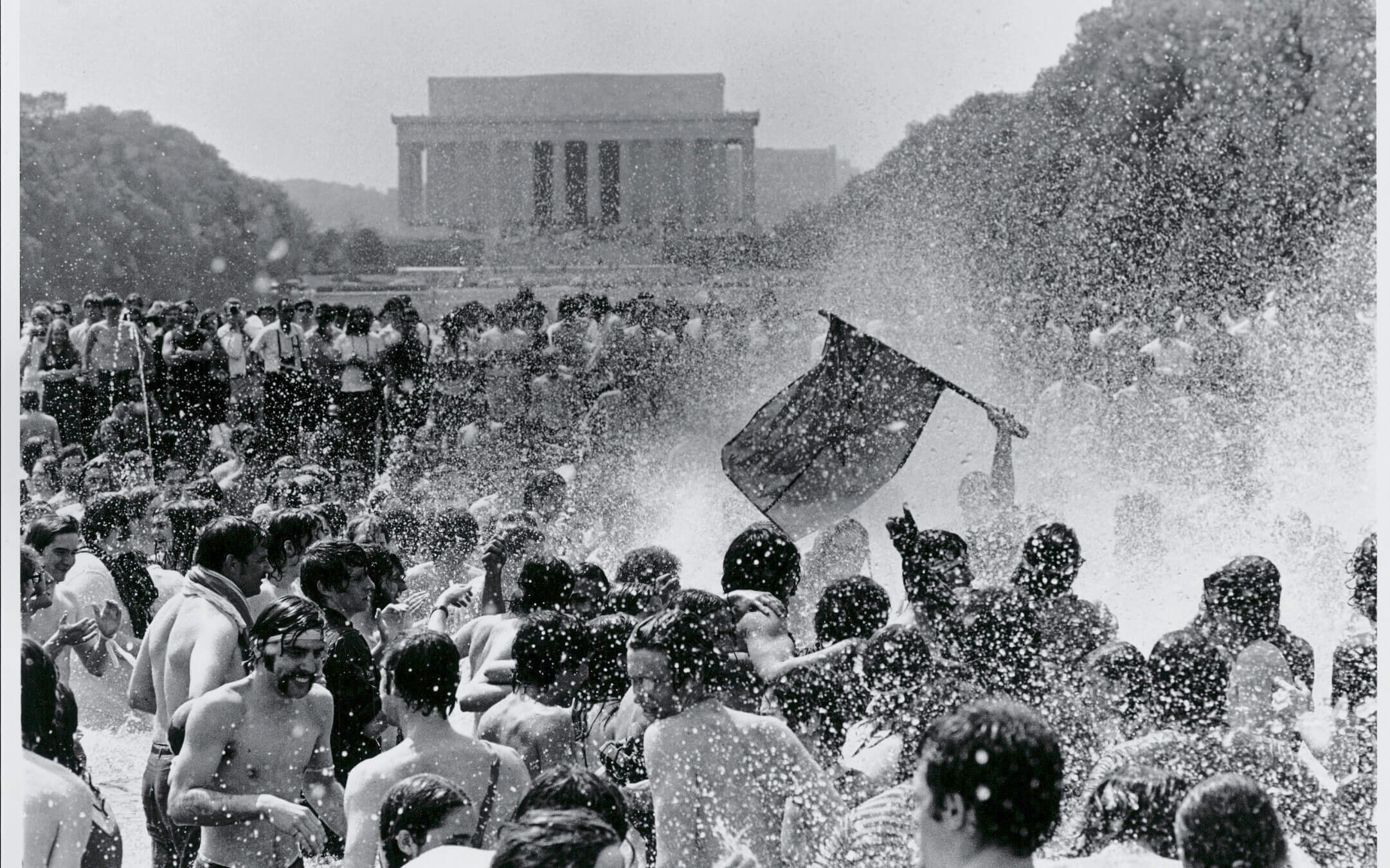Why I marched on Washington for the first time in more than 50 years
In 1970, it was about Kent State; this time, it was about Israel

Protesters rally against the war in Vietnam, in Washington, DC, May 9, 1970. Photo by Getty Images
It was 34 degrees, cold even for Boston, the vast parking lot at Gillette Stadium at 8 a.m. an uninviting gray sea. Waving clipboards beside a small fleet of pristine white charter buses, young volunteers cheerfully shouted instructions to the hundred-plus adults — average age 60 and that’s being generous — telling us how to sign in and which motor coach to go to and to be sure to identify a “buddy” so that no one would inadvertently be left behind at one of the innumerable rest stops along the 10-hour way.
They were in their 20s, revved up and herding us as if they were camp counselors, which in fact the one in charge of our bus had been — how did I know! she beamed at me — and we, their charges, easy to gently rib if anyone wanted to. A plethora of white hair, a mystical confusion over getting on a group WhatsApp, and — had the weather been warmer — probably Birkenstocks.

But no one was interested in offering up even mild barbs. It was going to be a long two days. The camp counselors were actually employees of CJP, Boston’s Jewish Federation, that was trying to make it easy for anyone who wanted to go to Washington to join the March in Support of Israel; cities around the world — London, Berlin, Paris, Stockholm — had attracted crowds of anti-Israel protesters of sometimes 100,000.
In our own backyard, demonstrators had gathered in Copley Square five days earlier to accuse Kamala Harris during her Boston visit of committing crimes against humanity for being Joe Biden’s vice president. College students across this university-heavy town had been staging sit-ins and die-ins, charging Israel with genocide and, at one school, sending around emails saying there should be no “space, consideration, or support for Zionism” on their campus.
The bus ride down to D.C. was understood to be deadly serious. The only people poking fun at us were ourselves. A man from my minyan elbowed me as we ascended the steps of the bus and said, “Should we have brought along guitars?”
The fact is, I hate rallies, demonstrations, marches. All that fist-waving and cheering on cue. The whiffs of performative activism — people doing whatever they’re doing to make themselves feel — or, worse, look — good.
The last time I went to a rally was in May 1970 to protest the Vietnam War. I can’t exactly say why I went. A handful of Polaroids from that day show me and my college roommate sitting on the grass looking pensive; in other photos, 10-foot-tall people in face paint and costumes lurch by on stilts.

But Vietnam permeated everything in our young university-centric lives. Twice, spring finals had been canceled because the faculty sided with the student protests. College deferments from the draft were being abolished. Kids at Kent State had been killed while demonstrating and we were all enraged. We hated Nixon and Robert McNamara. And though my brother had enlisted and was stationed at West Point teaching computer programming to cadets and my brother-in-law was practicing dentistry at Otis Air Force Base on Cape Cod, I saw the military as an extension of all that was ugly and morally suspect.
Eight years later, I was at the old movie theater in Kiryat HaYovel in Jerusalem to see Coming Home, which had managed to get past the censors who had their office down the hall from where I worked as a legal researcher for the fledgling precursor to the Israeli Ministry of Environmental Protection. The movie, starring Jane Fonda and Jon Voight, is a searing critique of the Vietnam War; by the time of its release, in 1978, a good part of America had come to agree.
After the film was over, I went outside. Maybe it was a matinee because I remember it was sunny and bright. And there, milling around on the sidewalks, were Israeli soldiers. Lots of Israeli soldiers. It was just everyday life. And right then I learned an important lesson that I needed to learn at 28: that my anti-military stance, while not exactly fraudulent or performative, was fungible. Mutable. Fluid as water.
And that the need for a standing army is entirely different when the enemy is at your border instead of 8,000 miles away.
On the Friday before the March in Support of Israel, the last day to sign up for the Federation buses, I jumped out of a hot bath after two minutes, wrapped myself in a towel, and told my husband we had to go. I had read about another 100,000-person rally against Israel in yet another European city, and it catapulted me out of the tub.
Did I go to feel solidarity? Ambivalently. There were legislators speaking who never in my life would I campaign for.
Did I go for performative reasons, to collect my halo? I hope not.
Did I go because I needed validation that antisemitism is bad? No. Because there’s no argument there.
I went because what if only 20,000 showed up? 40,000? Would those pressuring Biden to capitulate say, “See? There’s not so many of them. From all of America, they can’t even get as many as showed up in one measly European capital.”
And because what else could I do? I couldn’t pick avocados from rotting fields in the Gaza envelope or sort donated clothes for evacuees in Eilat or make the International Red Cross visit the hostages buried in the tunnels.
All I could do was wake up early on a cold morning and get on a bus.
















